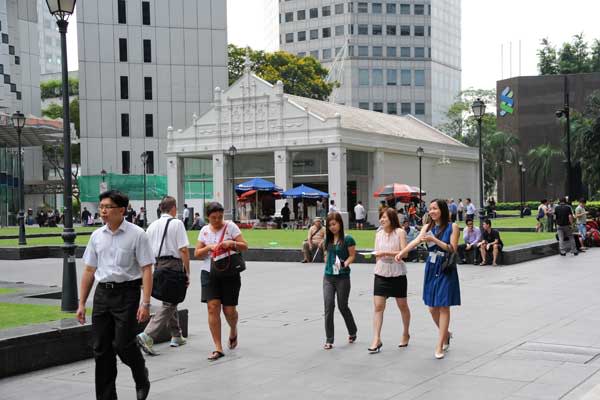‘Time to discard policies that divide S’poreans’

By Andrew Loh
For the longest time, Singaporeans who cast their votes did so for selfish, parochial and municipal considerations. It is, however, not their fault.
When Mr Goh Chok Tong became Prime Minister in 1991, he introduced the "asset enhancement" programme. This entailed upgrading of public housing flats which his government tied to support for his People's Action Party (PAP) in an election — if you voted for Mr Goh's party, you would get the programme. This in turn would up the value of your flat, resulting in a potential windfall if or when you sold your house.
The programme came on the back of the enactment of the Town Council Act in 1988 which the government said was "to ensure the proper management and maintenance of public housing developments in Singapore." Town councils would henceforth take over the management of housing estates from the Housing and Development Board (HDB).
Some have suggested that the Act was created to address the results of the previous general election in 1984 which saw two opposition members elected, Chiam See Tong and JB Jeyaretnam. If you voted the opposition, you would not receive these "asset enhancement" upgrading programmes.
PAP MPs, however, would be credited for estate enhancement initiatives leading to, the party hopes, an advantage for PAP candidates in each subsequent election.
Critics of the PAP saw this as unfair and an abuse of state resources, used for partisan political purposes by an incumbent ruling party. But the PAP did not pay any heed to these accusations.
Effective scheme
Thus, in the three general elections under Mr Goh as Prime Minister, and the elections of 2006 under Prime Minister Lee Hsien Loong, the purpose of the vote was reduced to a question of whether one wanted estate upgrading, to the virtual exclusion of all other issues, including national ones. The PAP was, the critics said, pandering to base and selfish instincts of the voter.
The strategy worked well for the PAP, however, as can be seen from the results of each of the five elections since 1991. The opposition had not won more than a miniscule four seats in Parliament in all of those years.
Part of the reason for the PAP's overwhelming support and Singaporeans' grudging acceptance of what some have called "vote buying" by the PAP was the economy. As long as it trudged along healthily and Singaporeans had jobs, most turned a blind eye to the discriminatory policy and practice of estate upgrading and would vote solely on the prospect of having a new lift or a covered linkway in their estate.
Politics in Singapore thus became one of gazing at one's navel, where one's selfish considerations took precedence over wider concerns.
For the PAP, this was perfect: the people get physical estate enhancements and the work of decision-making on national policies was uninterrupted or uninhibited. The Cabinet was given a free hand to do as it pleased, and MPs became essentially town managers.
As for the opposition parties and their MPs, as long as the ruling party held the purse, they did not stand a chance. This is proved by the fact that the single-member wards of Potong Pasir and Hougang, held by the opposition, have never had any estate upgrading for almost 30 years.
In the run-up to the 2011 general election, the PAP again rolled out five-year upgrading initiatives for each constituency to entice voters.
National over municipal
The opposition parties' campaign strategies with their focus on national issues, however, neutralised to a certain extent the PAP's game plan. Despite the PAP Aljunied GRC MPs' hard work in the constituency in the five years after the last general election, the opposition Workers' Party (WP) was able to effectively overturn its 2006 loss to a decisive victory and wrest control of the constituency from the PAP.
The WP's election platform was based not on municipal issues but on national issues, with its manifesto urging voters to support its vision of moving Singapore towards a First World Parliament. The overall better performance of all the opposition parties also indicates that Singaporeans place much stock on national issues as well.
With the next Parliament having a total of nine opposition MPs — six elected ones and three NCMPs — national issues will be given more airing, if these opposition MPs live up to expectations. This bodes well for political participation, awareness and dialogue at the national level. MPs after all aren't just town managers but should also be effective voices of the people on wider national issues in Parliament.
The PAP will have to finally realise that depending on municipal issues to carry its candidates into Parliament is no longer a sure-fire way to win votes, especially if national policies are carried out without consultation with the people and pushed through without transparency or accountability.
It should also realise that perhaps it is time to play fair and discard discriminatory policies which only serve to divide Singaporeans. The sooner it does this, the better it will be for the PAP. There is no more opportune a time to do this than now.
The Prime Minister, quite clearly, has said he is ready to listen. The voices of the people, from the results of the recent general election, have come through loud and clear.
The ball is now squarely on the PAP's side of the court.
Andrew is the co-founder and current editor-in-chief of socio-political website The Online Citizen. He writes frequently on issues which are close to his heart, particularly those affecting the less fortunate, and on politics.

